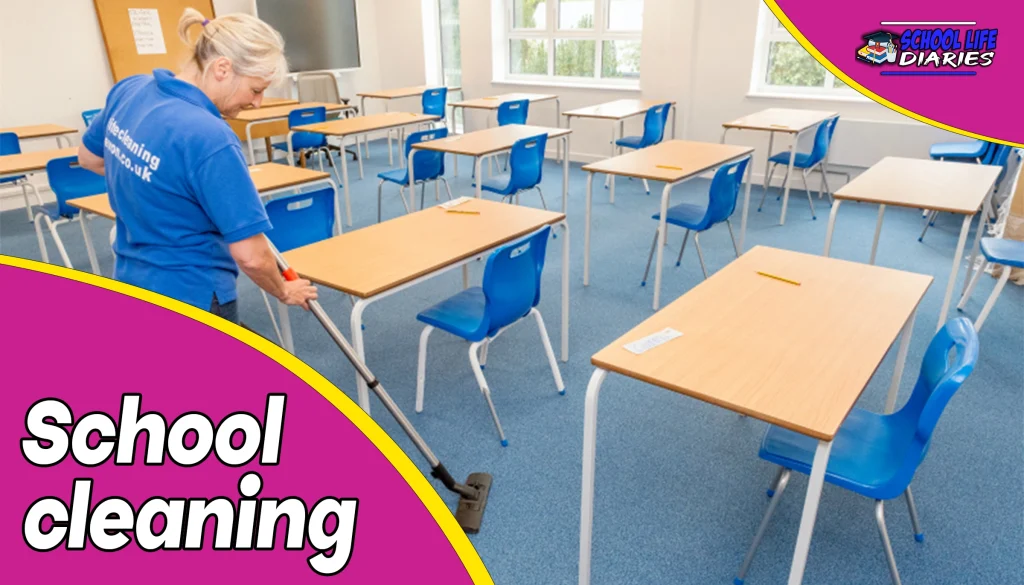When it comes to creating a conducive learning environment, one aspect that often goes unnoticed but plays a crucial role in school cleaning. While education, curriculum, and teachers are at the forefront of discussions about academic success, the importance of maintaining clean and hygienic school premises cannot be overstated.
A clean school not only enhances the overall aesthetic appeal but also promotes the well-being and safety of students and staff. In this blog post, we will delve into the significance of school cleaning, exploring its impact on student performance, health, and overall school culture.
From minimizing the spread of germs to fostering a positive learning atmosphere, join us as we uncover the hidden power of school cleaning and why it deserves our utmost attention.
What Is School Cleaning?
School cleaning refers to the systematic process of maintaining cleanliness and hygiene in educational facilities. It involves the regular cleaning and sanitization of classrooms, hallways, restrooms, cafeterias, and other areas within the school premises. School cleaning goes beyond basic tidying up; it aims to create a clean and healthy environment that is conducive to learning.
This includes tasks such as sweeping, mopping, dusting, disinfecting surfaces, emptying trash, and ensuring proper waste management. A clean school environment not only enhances the visual appeal but also helps prevent the spread of germs and contaminants, thus reducing the risk of illnesses among students and staff.
School cleaning plays a vital role in creating a positive and welcoming atmosphere that promotes student engagement, productivity, and overall well-being. By maintaining cleanliness in schools, we prioritize the health and safety of everyone within the educational community and provide a platform for optimal learning and growth.
How School Cleaning Can Prove To Be Beneficial For The Learners?
1. Promoting Health and Hygiene:
Creating a Safe Environment:
Preventing Absenteeism:
By maintaining cleanliness and hygiene, schools can contribute to reducing absenteeism due to illness, allowing students to attend classes regularly and maximize their learning opportunities.
2. Fostering Concentration and Focus:
Clutter-Free Spaces:
A clean and organized learning environment eliminates distractions and enables students to concentrate on their studies without unnecessary disruptions.
Improved Air Quality:
Regular cleaning practices, including dusting and proper ventilation, improve air quality, ensuring students have a fresh and conducive atmosphere for optimal focus and concentration.
3. Creating a Positive Learning Atmosphere:
Visual Appeal:
Sense of Ownership:
When students see their school as a clean and inviting space, they are more likely to feel a sense of ownership and take pride in their learning environment.
4. Enhancing Safety and Well-being:
Preventing Accidents:
Regular cleaning and maintenance help identify and address potential hazards, ensuring that the school premises are safe for students and staff.
Mental and Emotional Well-being:
A clean and well-kept school promotes a positive atmosphere, which contributes to the overall well-being of students, fostering a sense of comfort, security, and emotional stability.
5. Teaching Responsibility and Life Skills:
Developing Good Habits:
School cleaning instills a sense of responsibility and teaches students the importance of cleanliness and hygiene, nurturing lifelong habits that they can carry into their personal and professional lives.
Teamwork and Collaboration:
Involving students in cleaning activities, such as classroom tidying or recycling initiatives, encourages teamwork, collaboration, and a sense of shared responsibility within the school community.
By recognizing the significance of school cleaning, educational institutions can provide an environment that prioritizes the health, well-being, and academic success of their students.
From promoting a healthier atmosphere to fostering concentration and a positive learning environment, school cleaning plays a vital role in enhancing the overall learning experience and shaping students’ future success.
Why Regular School Cleaning is More Important Than You Think?
1. Health and Hygiene:
Regular school cleaning is crucial for maintaining a healthy and hygienic environment for students and staff. Germs and bacteria can easily spread in crowded spaces, leading to illnesses and absenteeism.
By implementing regular cleaning practices, such as disinfecting surfaces, sanitizing restrooms, and emptying trash, schools can minimize the risk of infections and create a safer environment for everyone.
2. Improved Indoor Air Quality:
Clean air is essential for the well-being and concentration of students. Regular cleaning helps remove dust, allergens, and pollutants that can accumulate in classrooms and common areas.
By ensuring proper ventilation, dusting surfaces, and regularly changing air filters, schools can improve indoor air quality, which positively impacts students’ respiratory health and overall comfort.
3. Reduction of Allergens:
Allergens like dust mites, pollen, and pet dander can trigger allergies and respiratory issues in susceptible individuals. Regular cleaning practices, such as vacuuming carpets, dusting surfaces, and cleaning air ducts, help reduce the presence of allergens, creating a healthier environment for students and staff with allergies or asthma.
4. Prevention of Pest Infestations:
Pests like rodents, insects, and pests can disrupt the learning environment and pose health risks. Regular cleaning helps identify and address potential entry points for pests, eliminates food sources, and keeps the school premises clean and unattractive to unwanted visitors.
By implementing pest control measures and maintaining cleanliness, schools can prevent infestations and ensure a pest-free environment.
5. Positive Learning Environment:
A clean and organized school environment promotes a positive learning atmosphere. When classrooms, hallways, and common areas are clean and clutter-free, students can focus better, feel more comfortable, and engage in their studies without distractions.
A visually appealing and well-maintained school environment also instills a sense of pride, belonging, and motivation among students and staff.
6. Long-Term Cost Savings:
Regular cleaning helps maintain the longevity of school facilities and equipment. By preventing dirt, dust, and grime buildup, schools can minimize wear and tear, prolong the lifespan of furniture and fixtures, and reduce the need for costly repairs or replacements in the future.
Investing in regular cleaning services can result in long-term cost savings for educational institutions.
7. Teaching Responsibility and Life Skills:
Involving students in cleaning activities can teach them valuable life skills and instill a sense of responsibility. By assigning tasks such as classroom tidying, recycling initiatives, or maintaining cleanliness in common areas, schools foster a culture of shared responsibility, teamwork, and good habits among students, preparing them for future success.
Advantages of Cleaning Your School
1. It Creates an Environment More Conducive to Learning:
A clean and well-maintained school environment sets the stage for effective learning. When classrooms, hallways, and common areas are tidy and organized, students can focus better, minimizing distractions and maximizing their concentration.
A clutter-free environment promotes a sense of calmness and order, creating an atmosphere that enhances learning experiences and academic performance.
2. School Cleaning Helps to Increase Teaching Efficiency:
A clean school allows teachers to focus on their core responsibilities of teaching and student engagement. When classrooms are clean and supplies are organized, teachers can easily locate materials, saving valuable instructional time.
A clean and organized environment reduces the time spent on managing disruptions caused by clutter or disarray, enabling teachers to dedicate more time to delivering quality education.
3. It Minimizes the Number of Employee Sick Days:
Regular school cleaning plays a crucial role in reducing the spread of germs and illnesses among both students and staff. By disinfecting surfaces, sanitizing restrooms, and promoting proper hand hygiene, schools can minimize the transmission of viruses and bacteria.
This, in turn, helps decrease the number of employee sick days, ensuring that teachers and staff can maintain a consistent presence in the school and provide uninterrupted education.
4. School Cleaning Builds Habits in Students:
By emphasizing the importance of cleanliness and hygiene, school cleaning helps instill good habits in students. Regular cleaning practices teach students the value of taking responsibility for their environment and fostering habits that can carry into their personal lives.
Students learn to clean up after themselves, properly dispose of trash, and maintain cleanliness in shared spaces, promoting a sense of community and personal accountability.
5. It Cultivates a Positive Reputation:
A clean school reflects positively on the institution and cultivates a strong reputation within the community. Parents and prospective students often consider the cleanliness and maintenance of a school when making enrollment decisions.
A clean and well-maintained school sends a message of professionalism, care, and commitment to providing a safe and conducive learning environment. A positive reputation can attract more students and contribute to the overall success of the institution.
6. It Promotes Mental Well-being:
A clean school environment has a direct impact on the mental well-being of students and staff. A tidy and organized space reduces stress levels and promotes a sense of calmness and tranquility.
Students feel more comfortable and at ease in a clean environment, which enhances their overall emotional well-being. Similarly, teachers and staff benefit from a clean and well-maintained workplace, contributing to their job satisfaction and overall mental health.
By recognizing the advantages of cleaning your school, educational institutions can create an optimal learning environment, improve teaching efficiency, foster positive habits in students, and establish a reputable image within the community.
Regular school cleaning promotes both physical and mental well-being, ensuring a conducive space for growth, learning, and success.
Related Article: Is College A Scam Or Worth It?
Conclusion:
The importance of school cleaning cannot be overstated. From creating an environment more conducive to learning to increase teaching efficiency, regular cleaning practices have numerous advantages for educational institutions.
By maintaining a clean and well-organized school environment, schools promote a positive learning atmosphere, reduce the spread of germs and illnesses, and minimize disruptions caused by clutter or disarray.
School cleaning instills good habits in students, fosters a positive reputation, and promotes the mental well-being of both students and staff.







